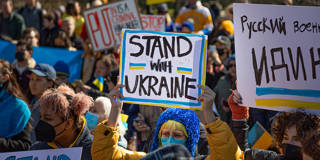In recent years, many young people in rich democracies have been in a funk over the virtues of democracy and liberalism. But the widespread condemnation of Vladimir Putin's war on Ukraine points to the emergence of a noble strand of identity politics based on the shared values of freedom, dignity, and respect for human rights.
LONDON – Twenty years ago, while standing in line at a Harvard cafeteria, I overheard one student say to another, “It is the moral equivalent of the Holocaust!” What could that be, I wondered. The Rwandan genocide? Cambodia’s killing fields? South American juntas causing opponents to “disappear” by throwing them into the ocean from helicopters? Eventually, the answer came: Eating meat was the moral equivalent of the Holocaust, and Harvard bureaucrats the guilty party for not providing sufficient vegetarian and vegan meal options.
I found myself recalling that moment as I watched videos of Russian shells falling on Ukrainian apartment blocks, schools, and maternity wards. President Vladimir Putin’s deliberate flattening of cities in an attempt to break Ukraine’s heroic resistance is surely a war crime, though not yet on the scale of genocide. I would like to think that those university students I overheard, and their successors today, would recognize the moral chasm between Putin’s heinous actions and the petty sin of enjoying a burger with fries.
In recent years many young citizens of rich democracies have been in a funk over the virtues of democracy and liberalism. Rather than fighting for survival, they have been skirmishing over pronouns. Rather than fearing that something they said on a bus could cause armed men to drag them out of bed in the middle of the night, they have worried that misspeaking in the classroom could earn them social-media opprobrium.

LONDON – Twenty years ago, while standing in line at a Harvard cafeteria, I overheard one student say to another, “It is the moral equivalent of the Holocaust!” What could that be, I wondered. The Rwandan genocide? Cambodia’s killing fields? South American juntas causing opponents to “disappear” by throwing them into the ocean from helicopters? Eventually, the answer came: Eating meat was the moral equivalent of the Holocaust, and Harvard bureaucrats the guilty party for not providing sufficient vegetarian and vegan meal options.
I found myself recalling that moment as I watched videos of Russian shells falling on Ukrainian apartment blocks, schools, and maternity wards. President Vladimir Putin’s deliberate flattening of cities in an attempt to break Ukraine’s heroic resistance is surely a war crime, though not yet on the scale of genocide. I would like to think that those university students I overheard, and their successors today, would recognize the moral chasm between Putin’s heinous actions and the petty sin of enjoying a burger with fries.
In recent years many young citizens of rich democracies have been in a funk over the virtues of democracy and liberalism. Rather than fighting for survival, they have been skirmishing over pronouns. Rather than fearing that something they said on a bus could cause armed men to drag them out of bed in the middle of the night, they have worried that misspeaking in the classroom could earn them social-media opprobrium.